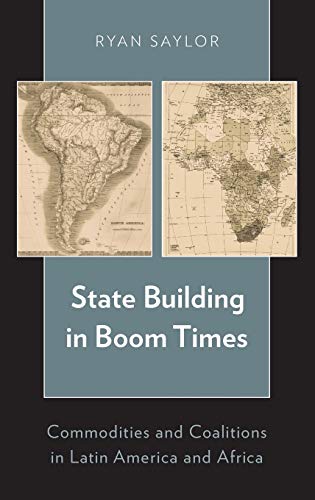All books / Book
State building in boom times: commodities and coalitions in Latin America and Africa

| Full title: | State Building In Boom Times: Commodities And Coalitions In Latin America And Africa University Press Scholarship Online |
|---|---|
| ISBN: | 9780199364954 |
| ISBN 10: | 0199364958 |
| Authors: | Saylor, Ryan. |
| Publisher: | Oxford University Press, Usa |
| Edition: | 1 |
| Binding: | Hardcover |
| Language: | en |
| Published on: | 2014 |
Read the reviews and/or buy it on Amazon.com
Synopsis
State Building In Boom Times Argues That Commodity Booms And Coalitional Politics Are Central To Understanding The State Building Variation Within And Across Latin America And Africa. It Shows How Resource Booms Can Trigger The Provision Of New Public Goods And Institutional Strengthening And Thus Help Countries Expand Their State Capacity. But These Possibilities Hinge On Coalitional Politics, As Seen Through Six Cases. Countries Ruled By Export-oriented Coalitions (argentina, Chile, And Mauritius) Expanded Their State Capacity As A Direct Result Of Commodity Booms. But Countries In Which Exporters Were Politically Marginalized (colombia, Ghana, And Nigeria) Missed Analogous State Building Opportunities Because Ruling Coalitions Preyed Upon Export Wealth, Rather Than Promoting Export Interests Via State Building. The Coalitional Basis Of These Divergent Outcomes Suggests That, Contrary To The Prevailing Belief In A Resource Curse, Natural Resource Wealth Does Not Necessarily Dispose Countries To Low State Capacity. Instead, Export-oriented Coalitions Can Harness Boom Times For Developmental Gains, Even In The Context Of Weak Institutions. This Finding Warrants Reappraising Some Widespread Presumptions About The Relationship Between Resource Wealth And State Building, As Well As The Public Policies That Are Commonly Proposed For Developing Countries To Manage Their Natural Resource Wealth-- Coalitional Politics Accounts For Why Resource Booms Yield Divergent State Building. Countries Ruled By Export-oriented Coalitions Expand State Capacity Amid Commodity Booms. But When Exporters Are Politically Marginalized, Ruling Coalitions Prey Upon Export Wealth, To The Detriment Of State Capacity-- Chapter 1 The Multiple Motives Behind State Building In The Developing World 1 -- The Revenue Imperative And State Building In The Developing World 1 -- Alternative State Building Motives 4 -- Boom Times And State Building In Coalitional Perspective 6 -- Commodity Booms And State Building In Latin America And Africa 8 -- Chapter 2 Boom Times, Coalitional Politics, And State Building 14 -- State Capacity, Public Goods, And Institutions: The Conceptual Terrain 14 -- A Coalitional Approach To State Building: The Theoretical Argument 21 -- Case Selection And Measurement 39 -- Alternative Hypotheses 50 -- Chapter 3 Striking State Building Due To Chile's Double Boom, 1848-1883 59 -- Chile At Mid-century 60 -- The Revenue Imperative And Chilean State Building 63 -- Chile's Double Boom In Wheat And Copper 65 -- Public Goods Provided, But Only To Ruling Coalition Members 66 -- An Opposition Enriched, Civil War, And Institution Building 75 -- Chile In 1883: A Precocious Latin American Leviathan 85 -- Chapter 4 Seizing State Building Opportunities During Argentina's Wool Boom, 1852-1886 88 -- Argentina At Mid-century 89 -- The Revenue Imperative And Argentine State Building 91 -- Argentina's Wool Boom 92 -- New Public Goods For Powerful Ranching Elites 93 -- Enriching Exports, Inter-provincial Conflict, And Institution Building 98 -- Argentina In 1886: From Port City To Modern State 107 -- Chapter 5 Sugar Exporters, New Public Goods, And State Building In Mauritius, 1825-1895 110 -- Initial Conditions In Mauritius, 1825 111 -- The Revenue Imperative And Mauritian State Building 114 -- The Sugar Boom And The Transformation Of Mauritius 115 -- Public Goods Seeking And Mauritian State Building 116 -- Without A Diametrical Threat, Mediated Institutions Remain 125 -- Mauritius In 1895: New Public Goods And A Growth In State Capacity 129 -- Chapter 6 Marginalized Coffee Exporters And Missed State Building Opportunities In Colombia, 1880-1905 131 -- Colombia In The Late Nineteenth Century 132 -- The Revenue Imperative And Colombian State Building 137 -- Colombia's Coffee Boom 138 -- Ostracized Coffee Exporters Fail To Obtain New Public Goods 139 -- A Non-elemental Threat Obviates Institutions Building 146 -- Persistent State Weakness In Colombia 151 -- Chapter 7 Nationalist Politicians Squander State Building Opportunities While Fleecing Cocoa Exporters In Ghana, 1945-1966 154 -- Ghanaat Mid-century 155 -- The Revenue Imperative And Ghanaian State Building 159 -- Ghana's Postwar Cocoa Boom 160 -- The Cpp Frustrates Exporters Efforts To Obtain New Public Goods 161 -- The Persistence Of Mediated Institutions In Postwar Ghana 168 -- Ghanain 1966: Illusory State Building And Low State Capacity 174 -- Chapter 8 Exporters' Marginalization And The Persistence Of Nigeria's Weak State, 1945-1966 177 -- Nigeria At Mid-century 178 -- The Revenue Imperative And Nigerian State Building 181 -- The Agricultural Commodity Boom 182 -- Politically Marginalized Exporters Fail To Obtain New Public Goods 183 -- Institutional Decentralization To Placate Nationalist Elites 191 -- Nigeria In 1966: An Enervated State 197 -- Chapter 9 Conclusion And Implications 200 -- Theoretical Implications 200 -- What Is The Resource Curse? 205 -- Policy Implications 210. Ryan Saylor. Includes Bibliographical References And Index.